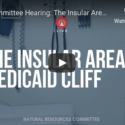The House Committee on Natural Resources held a hearing yesterday on “The Insular Areas Medicaid Cliff.”
Jenniffer Gonzalez-Colon, Resident Commissioner of Puerto Rico, informed the committee that 47% of the population of Puerto Rico relies on federal healthcare funding, compared with 21% for the 50 states. Matching for the states varies in response to the income of the state. If the same formula were applied in Puerto Rico, federal matching would reach the 83% level, the most a state can receive. Instead, Puerto Rico receives just 55% matching, with a spending cap.
That means there is a maximum spending limit. Once that money is spent, Puerto Rico receives nothing more in federal funds for healthcare. The territory must then pay all the additional costs.
In 2011, under the Affordable Care Act, Congress provided $6.3 billion for Puerto Rico in lieu of the marketplace. These funds were depleted last year and Congress provided a temporary fix. There were also additional funds and 100% matching in response to Hurricane Maria. All these additional funding sources will expire in September 2019. PR will exhaust its allotment of federal healthcare funds in the first three months of 2020. The inequitable treatment of Puerto Rico leads not only to limited healthcare access for residents of the Island, but also to a lower provider reimbursement rate, and to ongoing financial stress for the Island government.
The Resident Commissioner mentioned two bills which have already been introduce in Congress: HR2306, the Puerto Rico Medicaid Act, and HR1354, the Territories Health Equity Act.
Each territory’s witness described heartbreaking problems caused by inadequate healthcare funding. They described infants who were denied lifesaving care because of inadequate funds, the loss of specialists and other medical professionals, the inability to repair medical facilities, and the need to send patients as far as New Zealand for care.
“Federal healthcare funding has been insufficient for generations,” said Puerto Rico’s witness, Ms. Angela Avilá. The federal funding for 2020 covers only 19% of the expected cost. “The Medicaid cliff that Puerto Rico is facing is an emergency.”
“We all want to be part of the full Medicare system,” Sablan summed up.
Gonzalez-Colon shared that Mississippi received $7,000 per individual in while Puerto Rico received $2,000. She recommended that the territories should have the same formula as the 50 states. She pointed out that healthcare professionals receive less than half of the payment in Puerto Rico compared with health professionals on the mainland. “This is why we are losing one doctor a day,” she said.
Gonzalez-Colon asked how many individuals would lose their healthcare services if the Medicaid cliff is not avoided. Avila gave the number: 600,000.
Rep. Sablan asked each witness, “Could your program be run like a state, if you had state funding?” Each witness agreed that this would be possible.
“The fact is that the federal government is not saving money,” Rep. Sablan concluded. He pointed out that Puerto Ricans who move to the states cost three times as much as if they were served on the Island.
“American taxpayers’ money would be more effective if we solve this problem now,” Gonzalez-Colon confirmed. She pointed out that Medicaid benefits are limited in Puerto Rico, that income requirements are higher, and therefore those who move to Florida are more likely to be covered than those who stay in Puerto Rico.
“The number of physicians and surgeons dropped from 14,000 to 9,000 by 2016,” Gonzalez-Colon remarked. She asked Avila if the trend had continued.
“3,000 more have left the Island since 2017,” Avila responded.
“We have to get rid of the cap,” said Rep. Alan Lowenthal. He then asked, “How did we get here?”
Rep. Sablan explained the political history of the system. “The Senate addresses the states, not the territories,” he said. He emphasized his hope that all U.S. territories could participate in Medicaid in the same way that the 50 states do.
Ms. Gonzalez-Colon thanked all the members of Congress who attended the hearing. “I think it’s important for Congress to do something,” she said.
When a witness responded to her saying, “Thank you, Senator,” Gonzalez-Colon said, “When we are a state, I will be a senator” with a smile.
The healthcare inequities will be solved when Puerto Rico becomes a state. Tell your legislators that it is time for statehood.








No responses yet